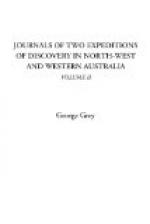2. Their generally receiving a very inadequate reward for the services they render; this, combined with their natural fondness for the bush, induces them to prefer that mode of subsistence which, whilst it is infinitely more agreeable and less laborious, procures for them nearly as great a reward as living with white people.
3. Their not being taught that different values are attached to different degrees of labour, as well as to the skill and neatness with which it is performed.
21. These impediments might all either be removed or modified in some districts by the establishment of native institutions and schools, but in forming a general plan for their removal which would be equally applicable to all parts of a colony, a very novel difficulty presents itself.
22. Imagining that a native child is perfectly capable of being civilised, let it also be granted that, from proper preventive measures having been adopted, this child has nothing to fear from the vengeance of the other natives, so that it stands in these respects nearly or altogether in the position of a European.
23. If this native child is a boy who is to pay the individual who undertakes to teach him some calling the fee usually given with an apprentice; who will indemnify this person for the time he spends in instructing the boy before he can derive any benefit from his labour, or for the risk he incurs of the boy’s services being bestowed elsewhere as soon as they are worth having?
24. Until this difficulty is got over it appears evident that the natives will only be employed in herding cattle, or in the lowest order of manual labour which requires no skill, and for which the reward they receive will be so small as scarcely to offer an inducement to them to quit their present wandering mode of life.
25. The remedy I would suggest for this evil would have another advantage besides a tendency to ameliorate it, for it would give the settlers a great and direct interest in the aborigines without entailing any expense upon the Government. It is founded on the following fact:
26. The Government, in order to create a supply of labour in the colonies, have been in the habit of giving certain rewards to those individuals who introduced labourers into them. Now it would appear that he who reclaims one of the aborigines not only adds another labourer to those who are already in the colony, but further confers such a benefit on his fellow-settlers by rendering one who was before a useless and dangerous being a serviceable member of the community, that this circumstance alone entitles him to a reward.
27. I would therefore propose that, on the production of the hereafter-named documents, a settler should receive a certificate entitling him to a certain sum, which should either be allowed to reckon towards the completion of location duties, or else as a remission certificate in the purchase of land, or, in lieu of this, a grant of land; and that this sum or grant should be regulated according to a table specifying the various circumstances that are likely to occur, and drawn up by the local government of each place where such regulation should be introduced.




